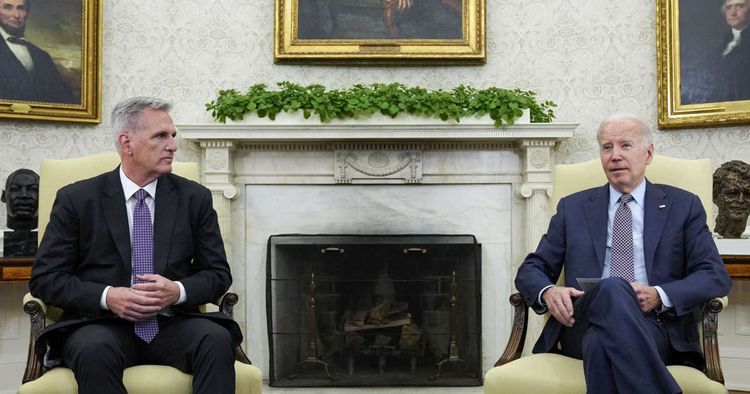Economic Rebound Needed To Boost Oil Rally

The blog section requires some revision to make the language easier to understand. Here are some possible changes: - We need to make this blog section easier to read. - Let's use shorter sentences to help people understand. - The image is from Alex Brandon at the Associated Press. - Using simpler language can make a big difference. - People can struggle to understand technical terms. - We don't want anyone to feel excluded. - Clear communication is important for everyone. - Let's try to be more accessible in our writing. - Writing for a wider audience is a positive choice. - We all benefit when communication is clear and inclusive.
Oil prices went up last week because House Speaker Kevin McCarthy and President Joe Biden reached an agreement on the debt ceiling.
Analysts said we need more data to confirm major economies are rebounding for a crude oil price rally. This week could bring some new developments on Iranian barrels.
The U.S. politicians passed the debt ceiling resolution. They did it in time to prevent a default. This made the oil price go up towards the end of the week.
Biden says the agreement is a big win. Not everything is achieved in a negotiation. Both parties agree. The American people benefit. It happened on Thursday.
People were relieved by the agreement and it stopped oil prices from falling too much. The U.S. benchmark, West Texas Intermediate, had trouble gaining overall for the week but ended on Friday at around $70.
The price of oil on Monday is affected by the recent OPEC+ meeting. The meeting includes core members of OPEC and nonmember state allies like Russia.
China's economy is recovering, and oil prices are benefiting. This is according to Graeber's recent blog post. The global pandemic caused economic struggles worldwide, but China seems to be bouncing back. As China's economy improves, so too does the price of oil. This is good news for the oil and gas industry. Graeber's analysis shows that there is a connection between China's economic performance and the price of oil.
In May, the group agreed to cut oil production to raise prices. However, it didn't work out as planned because of worries about inflation and recession. The rally was short-lived.
Before the weekend meeting, Saudi Arabia and Russia, who are the big shots in OPEC+, argued about production policies. Their fighting might weaken confidence in what is usually considered the oil market's main bank.
The editor-in-chief at Petroleum Economist thinks the market is still struggling, despite OPEC+ doing more. He says the U.S. and China's economies aren't growing enough. He thinks it's hard for the group to change things.
He said the market needs more convincing. This is because demand for oil needs to be higher than supply. Only then will oil prices rise significantly. The global economic outlook is not good. OPEC+ has tried to reduce output, but this is not enough to support the economy.
European Central Bank President, Christine Lagarde, warns that inflation is too high and will last too long. The US labor market is strong, which means the Federal Reserve may have to put in extra work to support demand and continue inflation.
The oil price is not just controlled by OPEC+ decisions, but also global growth and demand outlooks. Ole Hanson, the head of commodities strategy at Saxo Bank, said this. The U.S. economy is uncertain and China didn't rebound as strongly as expected after lifting COVID-19 restrictions.
The market might stay quiet because some big questions are still unanswered. We don't know what the Chinese economy will do soon, or if there might be a recession in other places. We're also unsure about what might happen with U.S. interest rates. Even though there might be a lack of supply later this year, the market could still stay subdued. (Note: The original sentence is already pretty short and concise, so there wasn't a huge difference in length when rewriting.)
GOP senators in Texas are pushing to stop clean energy. They want to protect the state's oil industry. This move comes after President Biden's plan to address climate change. Texas's oil industry is a massive contributor to the state's economy. But, it's also a big contributor to greenhouse gas emissions. Clean energy would help reduce these emissions. However, GOP senators argue that it would hurt jobs and the economy. This battle between the oil and clean energy industry is likely to continue.
China's private business trends gauge is out tomorrow. Inflation data in May will be released later this week. There are two other important things to watch this week: mortgage applications in the U.S. economy and GDP in the European Union.
Jeff Mower from S&P Global Commodity Insights is interested in the upcoming meeting of the International Atomic Energy Agency. It's a nuclear watchdog for the United Nations. It's the main focus of the market for him.
Last week, the agency resolved concerns about Iran's nuclear program. This makes people less worried about Iran's goals. Iran is a top OPEC producer but has faced sanctions. The agency's findings could help lift sanctions and let Iran sell more oil.
There's talk that the U.S. and Iran might be making a deal. Iranian media said there was progress on nonproliferation issues with the IAEA. But that news might not be trustworthy.
The chances of lifting the oil sanctions are low. But people who follow the market believe there is still hope. If Iran starts selling oil again, it will lead to a decrease in prices.
If you buy something through links in this article, you might help Microsoft and its partners earn some money.



























































